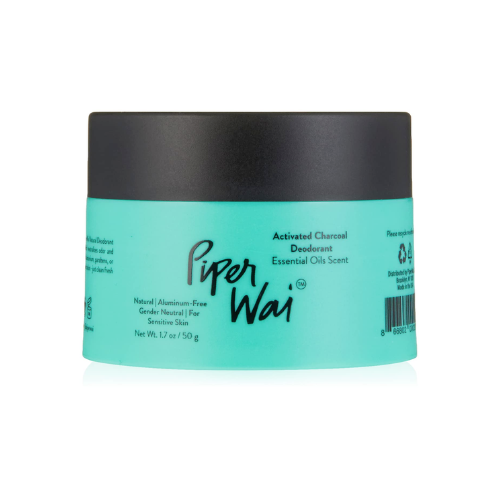

piper wai
In this post, I share a product recommendation for Piper Wai deodorant.
As an Amazon Associate, I earn from qualifying purchases.
As someone with MCAS, I’m sensitive to most personal care products and essential oils, so this product won’t work for everyone with MCAS. But I like Piper Wai because they take care with sourcing quality ingredients, offer sustainable packaging, and the deodorant really works! Also, I’ve tried a lot of “natural” deodorants, and this one is relatively inexpensive for what you get. And you can take advantage of the 15% off coupon below for greater savings.
Mast Cell Activation Syndrome (MCAS) is a chronic condition that affects all organ systems. MCAS is serious and disabling and people with MCAS experience often significant and debilitating symptoms daily, including anaphylaxis, which can be fatal.
MCAS is often found in combination with other chronic conditions such as Ehlers-Danlos Syndrome (EDS) and Postural Orthostatic Tachycardia Syndrome (POTS).
Frequently healthcare providers do not know about MCAS, and the tests for MCAS are problematic because they are not uniformly reliable. MCAS can be difficult to manage. Treatments include blocking mast cell mediators with anti-histamines and mast cell stabilizers, as well as avoiding triggers.
Check out this post on how to manage MCAS.
I like Piper Wai deodorant because it is made in the USA, Woman-Owned, Black-Owned, Cruelty-Free, and Vegan-Certified. They use sustainable packaging using recycled content and infinitely recyclable BPA-free aluminum containers.
Activated Charcoal Activated Charcoal is a porous substance that’s super absorbent for moisture and even the stinkiest odors.
Coconut Oil – Loaded with fatty acids, antioxidants, and vitamin E, coconut oil is moisturizing, easy to absorb, and great for restoring the skin’s natural pH.
Piper Wai is gentle on sensitive skin, packed with anti-inflammatory and skin-conditioning ingredients, like shea butter, that soothe skin and won’t cause irritation.
Use this coupon to get 15% off your purchase of Piper Wai this month:
15% off Code: PiperW15
Here is the link to the product link.
The bucket theory offers a helpful analogy for understanding symptom reactions with MCAS.
Think of your body as an empty bucket that you want to keep from overflowing. Different foods and activities fill your histamine bucket at different speeds but they combine to form the total level of histamine in your body (how full your bucket is). A fuller bucket means you have more histamine symptoms. When you manage triggers, reduce exposure to known triggers, and take medications and supplements to reduce histamine, you can manage the level of your bucket.
Knowing your symptom progression in a symptom flare is the key to developing your own rescue plan. In this post, I discuss how to determine your own symptom progression. Once you know what typically happens in your symptom progression you can design a rescue plan to address those symptoms.
Want a tool to easily keep track of your symptoms? Sign up for my newsletter and you will receive my free 50-page ebook of lower-histamine, grain-free, sugar-free recipes, my free symptom log, and a free two-week meal plan!
The Safe and Sound Protocol (SSP) is a listening therapy based on Polyvagal Theory created by Stephen Porges to unlock your ability to think, feel, and connect better through nervous system regulation. You use the SSP via an app on your phone and listen with over-the-ear headphones to specially filtered music that heals the nervous system, specifically the vagus nerve. You subscribe to the app with a provider like me and listen to the specially curated music for 30 minutes each day for a 5-hour cycle. Studies show the SSP has a profound effect on mental health and chronic conditions
You can sign up for the SSP here!
Rocks and Roots chronicles my journey solo backpacking the Superior Hiking Trail and overcoming nervous system dysregulation, gut dysbiosis, and Mast Cell Activation Syndrome symptoms to hike 328 miles successfully.
Healy is an individualized microcurrent device I use to reduce inflammation. Check out this post for more about Healy.
I provide one-on-one in-person and remote chronic illness and caregiver coaching and Sacred Self-Healing Sessions based on the Sacred Self-Healing Method, a proven novel co-creative healing modality detailed in my Books.
Click here for more information.
I’d love to have your reply below!
The preceding material does not constitute medical advice. This information is for information purposes only and is not intended to be a substitute for professional medical advice, diagnosis, cure or treatment. Always seek advice from your medical doctor.
Here's my new recipe for lower histamine zucchini nooodle primavera! It's light, filling, and perfect…
This blog post is about making the most of natural light signaling. As an Amazon…
Did you know that Betsy offers chronic illness support coaching? This post discusses the benefits…
This post discusses the topic of what is the best nervous system retraining program. What…
This post discusses using binders for toxins when you have MCAS. Toxins are one of…
This post discussed a technique called the SSP thirty-second reset, which stops my MCAS symptoms…
This website uses cookies.